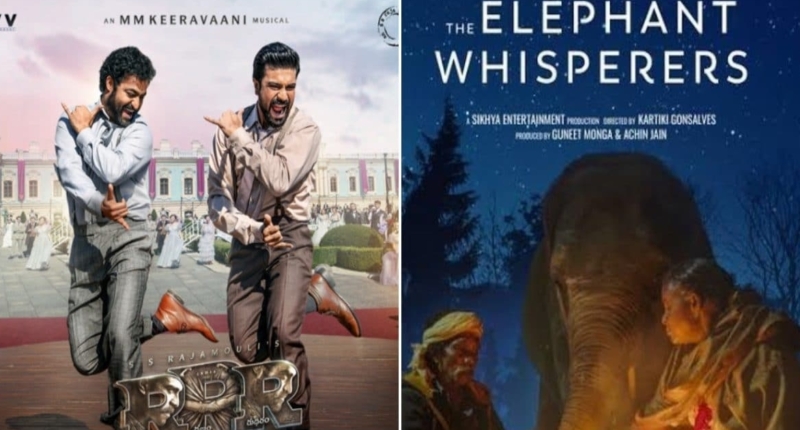India’s unique way of knowing and being must be brought to the forefront of public and personal consciousness. The concept of Indian decoloniality should be revisited to help achieve this goal. To do this, we must educate ourselves on the literature of Indian decoloniality, which has been formulated and articulated in precise terms over the last two centuries. However, we must avoid the trap of becoming a Kūpa-maṇḍuka, the frog who lived in the well, and avoid cutting ourselves off from the outside world. In doing so, we can build awareness about India’s history and unique cultural contributions, which will ultimately build a positive image of India and Indians around the globe.
The Oscars and Decoloniality: Understanding Acharya Bhattacharya’s warnings for India’s reaction to International Film Awards
Acharya Krishna Chandra Bhattacharya, a leading Indian philosopher from the early 20th century, cautioned about navigating modern times, where the ideals and ideas of a nation interact with those from the world outside. In his discourse, “Swaraj in Ideas,” he warned against the dangers of not applying learned principles effectively and indulging in glib talk about a conflict between the West’s ideals and those of India’s tradition. His warnings are still relevant today, especially when analyzing India’s reaction to international film awards events.
At the recent Oscars, ‘Naatu Naatu’ from S.S. Rajamouli’s ‘RRR’ won the ‘Best Original Song’ category, and Kartiki Gonsalves’ ‘The Elephant Whisperers’ also received recognition. However, reactions in India have been mixed, with some feeling guilty for celebrating international success and others embracing it.
Bhattacharya’s warnings about not applying learned principles effectively apply to this situation. Indians have a fair acquaintance with Western life and thought, but there is confusion about how to apply bookish principles to real-life situations. There is no real conflict between the West’s ideals and those of India’s tradition, but only confusion regarding the ideas and ideals involved. Indulging in glib talk about a conflict without being serious about either ideal is a folly that Bhattacharya warned against nearly a hundred years ago.
Bhattacharya’s discourse highlighted the importance of deepening the soul by being serious about ideals and considering them matters of life and death. The danger lies in complacently acquiescing in confusion without striving to develop it into a definite conflict. Bhattacharya’s warnings are still relevant, especially when considering India’s reaction to international film awards events, where there is confusion regarding the ideas and ideals involved.
In conclusion, Bhattacharya’s warnings are relevant in today’s world, especially when considering India’s reaction to international film awards events. Indians need to apply their learned principles effectively and not indulge in glib talk about a conflict between the West’s ideals and those of India’s tradition. They need to deepen their souls by being serious about ideals and considering them matters of life and death. By doing so, Indians can embrace international success without feeling guilty about it.
The Oscars and Decoloniality: The Recent Indian Entries’ Success and the ‘Decoloniality’ Concept
Two Indian entries emerged victorious at this year’s Annual Academy Awards (popularly known as the Oscars), namely ‘Naatu Naatu’ from S.S. Rajamouli’s nationalist drama ‘RRR’ and Kartiki Gonsalves’ ‘The Elephant Whisperers’ in the categories of ‘Best Original Song’ and ‘Best Documentary Short’, respectively. The news of the double success elicited elation among many Indians, but surprisingly, a section of social media commentators and writers, who claim to speak from a ‘Hindu standpoint’, expressed disgruntlement over the celebratory mood displayed by their fellow countrymen.
What is even more surprising is that their disagreement does not stem from the award choices made by the Academy’s voting members. Instead, they have turned to the oversimplified concept of ‘decoloniality’, which has gained recent traction among this unhappy section. By adopting a crude reductionist approach to the term, they peddle the idea that celebrating Indian entries’ success at international events is tantamount to acquiescing to colonialism.
This disgruntled section’s adoption of the ‘decoloniality’ concept highlights the dangers of simplistic slogans, which are popular on social media. They do not require people to engage their mental faculties, and users can quickly gain virtual followers by spouting them. However, such oversimplification can lead to confusion and misunderstandings, as seen in this instance.
In conclusion, the success of the Indian entries at the Oscars has elicited elation among many Indians. However, a section of social media commentators and writers, who claim to speak from a ‘Hindu standpoint’, expressed disgruntlement over the celebratory mood displayed by their fellow countrymen, using the oversimplified concept of ‘decoloniality’ to argue against it. This highlights the dangers of simplistic slogans and the importance of engaging in nuanced and critical thinking.
India’s Form of Decoloniality: A Rich and Layered Resistance
Decoloniality is a theoretical concept that provides a culture-specific way of being and knowing, offering an alternative to the universalistic Euro-American colonialist way of life that seeks to dominate other cultures. Practising decoloniality can dismantle the hegemony of colonialism, and each formerly colonised nation has the potential to evolve and offer its version of decoloniality based on its peculiar historical experience and national character.
India has its form of decoloniality, which evolved from withstanding a double whammy of successive colonialist projects: Islamic rule and British colonial rule. This distressing and prolonged experience of political and cultural colonialism resulted in India’s resistance becoming much more layered and richer than any other anticolonial resistance worldwide. Other nations have drawn inspiration from India’s resistance to resist and change the dehumanising status quo perpetuated by colonialists.
India’s civilisational legacy, evolved through millennia of pre-colonial Indian history and socio-cultural revolutions occurring at both precolonial and colonial periods, helped India surge boldly ahead into the future. In the process, India’s assimilating power has resulted in a rich and layered resistance, which assimilates differences into its mainstream without allowing fundamental changes to occur in its character.
In conclusion, India’s form of decoloniality is a rich and layered resistance that evolved from withstanding successive colonialist projects. Its civilisational legacy helped India assimilate differences into its mainstream without changing its character, making its resistance much more layered and richer than any other anticolonial resistance worldwide.
India’s Distinct Decoloniality Shaped by History and Culture
India has recently celebrated double success in the Oscar Awards, as two Indian entries won the top titles in their categories. The concept of decoloniality, which is a theoretical approach that provides a radical alternative to the Euro-American colonialism that dominated much of the world, has been the subject of discussion in some quarters of Indian society. This has led to a debate about India’s unique decoloniality that has been shaped by its historical circumstances and cultural currents that are not exclusive to India, as the country has constantly interacted with various nations of the world.
India has had to withstand a double whammy of successive colonialist projects, the first of which was a traumatic Islamic rule across several large parts of the Subcontinent. The British colonial rule that engulfed almost the entire country and invaded every aspect of Indian life followed it. However, India’s resistance to colonialism has evolved to be much more layered and richer than any other anticolonial resistance anywhere in the world due to the sheer historical and geographical magnitude of the twofold colonial impact.
The decoloniality of India, shaped through its historical and cultural evolution, has been much more diverse and inclusive than any other form of anticolonial resistance. This Indian decoloniality has been influenced by global historical events, including the French Revolution, the American Revolutionary War, the Unification of Italy, the Russian Revolution, and more. However, India has assimilated these external elements into its time-tested civilisational character, attempting to maintain its cultural identity while embracing modernity.
The last two centuries were crucial in giving shape to India’s version of decoloniality. The country assimilated external influences while still maintaining its unique cultural identity. Extraordinary minds in fields like religion, education, philosophy, politics, the arts, and the sciences contributed to shaping India’s decoloniality. These figures, including Mahatma Gandhi, Rabindranath Tagore, and Swami Vivekananda, were self-effacing, benevolent, and had profound thinking and clarity in their articulation. It is thanks to their contributions that India’s assimilative decoloniality was made future-ready for India and the rest of the world.
India has a rich history of cultural and political revolution that has helped shape its unique version of decoloniality. While India faced a particularly challenging experience of political and cultural colonialism from both Islamic and British colonial rule, it has managed to resist and evolve its own distinct form of decoloniality. India’s assimilative decoloniality has been shaped by historical circumstances and cultural currents, including influences from other world historical events such as the French Revolution, American Revolutionary War, Italian Carbonari Movement, Unification of Italy, shaping of the modern German state under Bismarck, the Irish Revolutionary Movement, and the Russian Revolution. India’s 19th and 20th centuries were critical in shaping this decoloniality, thanks to the extraordinary minds and personalities in various fields who helped shape and articulate it. Despite the complexity of Indian history, the popular discourse on decoloniality tends to reduce it to a mere slogan. While slogans can be useful to create excitement, they also strip individuals of their power to reflect. Recently, some social media commentators with an ill-understood perception of decoloniality have targeted Indians celebrating the success of Indian films overseas, citing the celebratory mood as a flaw in their understanding of decoloniality.
Little understanding of the nature of competition
The popularity of international film festivals and awards ceremonies generates a lot of excitement, which is perfectly natural. People are entitled to celebrate their success and express their joy. However, some decoloniality sloganeers don’t seem to realize that competition, of any kind, can create intense anticipation and the need for momentary outbursts when success or failure is announced. They fail to understand that competition, if conducted fairly, can be beneficial and motivate participants to excel in their craft.
Misplaced criticism of cultural recognition
Unfortunately, these same decoloniality sloganeers often criticize prestigious cultural awards, such as the Oscars, without recognizing the benefits that come with recognition in the arts. Instead, they should focus on the economy of show business, which often values commercial success over cultural excellence, a critique which the renowned poet Rabindranath Tagore also made in his essay “Brahmana“. By shifting the focus to the underlying issues with the cultural industry, they could offer a more genuine critique and improve the cultural landscape.
A hypocritical stance
It’s hypocritical for these same individuals to criticize recognition in the arts while praising recognition in sports. India has a proud tradition of success in various international sports competitions, including cricket, hockey, football, and athletics. If they believe that recognition in the arts should be decried, then they should also denounce international sports events like the Olympics and the US Open tennis tournament. But the truth is that recognition for hard work and talent is essential in any field, including the arts.
Indian Films and the Oscars
The recent success of Indian films at international film festivals and award ceremonies has generated excitement among fans and supporters of the Indian film industry. However, some critics have questioned the relevance of such recognition, arguing that it does not align with India’s cultural values and decoloniality.
Decoloniality and the Oscars
Critics of the Oscars argue that they promote a culture of competition, which is not consistent with Indian cultural values. However, this argument overlooks the fact that competition can be a positive force that drives individuals to excel in their craft. Furthermore, international recognition for Indian films and filmmakers can help to promote Indian cultural values and decoloniality on a global scale.
The Importance of Recognition
The success of Indian films at international film festivals and award ceremonies can help to attract more attention to the Indian film industry and the works of Indian filmmakers. For instance, the documentary film, The Elephant Whisperers, gained wider recognition after winning an Oscar, leading to greater exposure and opportunities for the filmmakers involved.
The Essence of Indian Civilization
Moreover, Indian films can promote Indian cultural values and decoloniality through their portrayal of Indian ways of life and perspectives. For instance, The Elephant Whisperers depicts a classic vignette of a patently Indian, Hindu way of life that is integrated with nature in perfect harmony. The film’s portrayal of the protagonist’s relationship with an elephant calf illustrates the essence of Indian civilization’s attitude to life.
In conclusion, while some critics may question the relevance of international recognition for Indian films and filmmakers, such recognition can help to promote Indian cultural values and decoloniality on a global scale. Furthermore, the success of Indian films at international film festivals and award ceremonies can help to attract more attention to the Indian film industry and the works of Indian filmmakers.
Indian Cinema and Its Positive Impact on India
The Academy Award-winning film ‘RRR’ has put Indian cinema in the global spotlight, with its celebration of Indian nationalist freedom struggle and dharma-based angle of justice and respect for every living being. While opinions differ on the best song from the film, the attention garnered by the Oscar-winning ‘Naatu Naatu’ will likely draw more people, of different tastes and backgrounds, to watch this modern epic, directed by S.S. Rajamouli.
With this increased global attention, more people will have the opportunity to take note of the ethos of Indian civilization that pervades Indian cinema. The positive impact of this increased awareness can be substantial, building a positive image of India and Indians worldwide.
The film’s operatic celebration of characteristically Indian loyalty towards family, friends, community, and homeland, along with its revolutionary spirit, provides a glimpse into the heart of Indian civilization. It showcases Indian sensibilities, attitudes, and unique way of being and knowing, which have evolved over centuries of struggle and sacrifice.
As more people from various countries, of different generations and tastes, sit through modern Indian epics like ‘RRR’, they can gain a deeper appreciation for Indian culture, history, and values. This newfound appreciation can foster a greater understanding of India and Indians, ultimately promoting global harmony and cross-cultural exchange.
Conclusion
The Oscar recognition of ‘RRR’ highlights the significance of Indian cinema as a medium for cultural exchange and appreciation. This attention can lead to a positive image of India and its civilization worldwide. As more people watch Indian films and become familiar with Indian values and sensibilities, global understanding and harmony can be fostered.
The Farce of Decoloniality Sloganeers
The oversimplified reasoning of decoloniality sloganeers is reducing a profound concept to a mere slogan. Their self-righteousness is becoming nauseating, claiming that international recognition of indigenous cultural products is irrelevant since India is now ‘decolonising’ herself.
Lack of Respect for Indigeneity
Decoloniality sloganeers judge those who attach importance to international recognition as lacking respect for, or faith in, indigeneity. This faulty argument is an object of ridicule and their moral high ground seems smugly oblivious of their dopiness.
Our decoloniality sloganeers dwell in social media echo chambers, smugly claiming moral high ground. This sort of one-upmanship feels utterly obnoxious and hinders the positive image of India and her unique way of being and knowing.
The Need for Clarity in the Discourse of Decoloniality
The so-called decoloniality sloganeers seem to have reduced decoloniality to a mere slogan, demonstrating a lack of understanding of the concept’s complexity. Their air of self-righteousness is nauseating, as they claim that international recognition of indigenous cultural products is irrelevant because India is now ‘decolonising’ herself. Furthermore, they judge those who attach importance to such recognition as fundamentally lacking in respect for, or faith in, indigeneity.
However, the project of Indian decoloniality has been formulated and articulated in precise terms over the last two centuries. The blueprint and direction were meticulously worked out in the writings of thought leaders of the time. The project had the blessings of the preceding centuries and reached its climax in the 19th century, with completion by the 20th century. But in present-day democratic electoral politics, the project seems to have lost its way.
The Flawed Logic of Decoloniality Sloganeers
The complacency and smugness of the decoloniality sloganeers are founded on a flawed line of reasoning. They claim that India is presently ‘decolonising’ herself, and thus international recognition of indigenous cultural products is irrelevant. This oversimplified argument ignores the complexity of decoloniality and the significance of international recognition in building a positive image of India and Indians worldwide.
The Urgency of Articulating Indian Decoloniality
The need for clarity in the discourse of decoloniality is pressing, given the significance of the project of Indian decoloniality. The work of thought leaders of the past is invaluable in shaping a modern-day version of Indian decoloniality. However, the project seems to have lost its way in the desert sand of present-day democratic electoral politics.
The decoloniality sloganeers’ complacency and self-righteousness demonstrate a lack of understanding of the project’s urgency and the significance of international recognition in spreading awareness of India, her history, and unique way of being and knowing. It is crucial to articulate Indian decoloniality precisely and to build a positive image of India and Indians globally.
Educate ourselves in Indian Decoloniality
The urgency of educating ourselves in Indian decoloniality, formulated and articulated by thought leaders in the last two centuries, is a paramount task. It must be approached with a greater sense of urgency than that with which the architects of the project had taken it up in the early 19th century. The idea is to bring back the Indian way of being and knowing to the centre stage of our public and personal consciousnesses.
Indian Way of Being and Knowing
It’s essential to understand that the Indian way of being and knowing doesn’t seek to cut India off from the outside world. As Swami Vivekananda once said, “nothing can be bigger than my well; there can be nothing bigger than this; this fellow [another frog that came visiting him from the seaside] is a liar, so turn him out.” To avoid ending up like the frog who lived in the well, it’s crucial to embrace Indian decoloniality without being parochial.
Rediscovering Indic Consciousness
Sreejit Datta, an educator, researcher, and social commentator, stresses the need to rediscover and rekindle the Indic consciousness in a postmodern, neoliberal world. He believes that it is essential to be cautious of reducing Indian decoloniality to a mere slogan or oversimplifying it. Doing so would limit its potential and render it useless.
It’s high time that we delve deeper into Indian decoloniality and understand the blueprint and the direction it ought to take. By doing so, we can bring back the Indian way of being and knowing to the centre stage of our public and personal consciousnesses.
Don’t miss interesting posts on Famousbio










